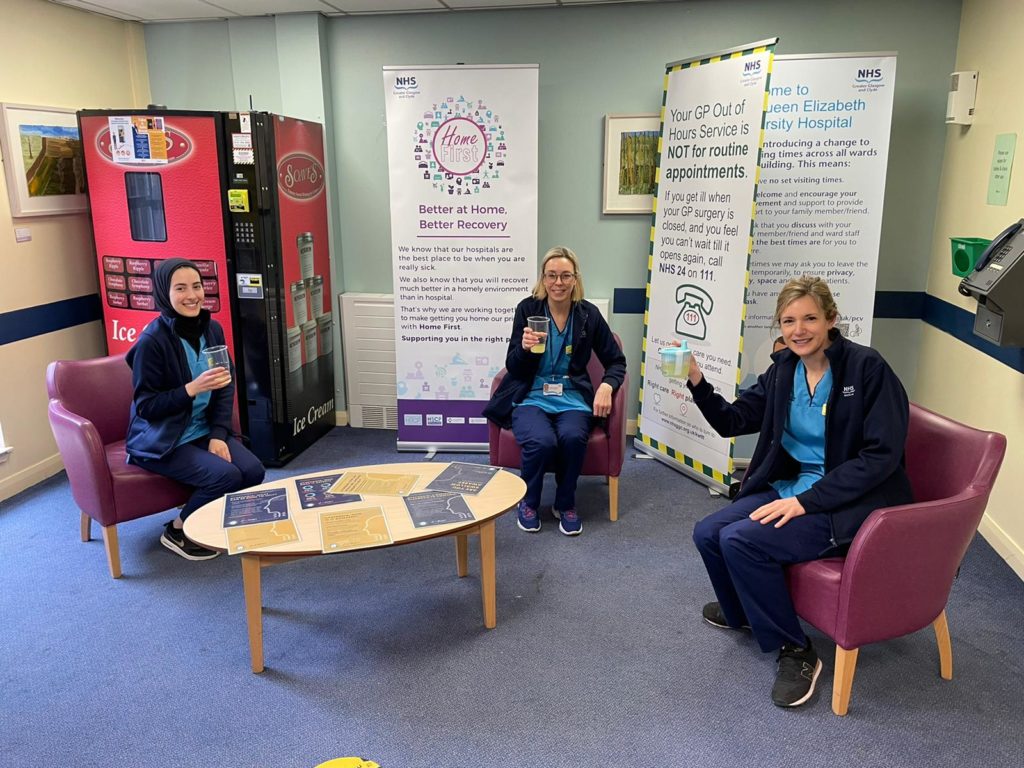
Speech and Language therapists at Glasgow’s Queen Elizabeth University Hospital (QEUH), have been raising awareness of a common but sometimes taken for granted condition, by simulating the experience of patients with ‘dysphagia’.
Dysphagia, the medical term for swallowing problems, impacts thousands of people every year, and can cause a drastic reduction in their quality of life, increasing the risk of malnutrition, dehydration and even choking if not managed appropriately. The condition affects a vast range of patients – from stroke patients, the elderly, acutely ill people, through to those with long term neurological conditions such as Parkinson’s and dementia.
This week, staff at the Langlands unit at the QEUH encouraged colleagues and visitors to try specially adapted diets and use special instruments to eat their lunches to help them understand the condition, its impact, and how the SLT team treats patients with the condition.
Various levels of purified foods were on offer – from completely purified foods through so ‘soft and bitesize’ to help demonstrate the range of tailored approaches to help support patients who have difficulty eating and drinking. Similarly, treatments on offer to help change the thickness of fluids to support patients with trouble drinking were also offered.
Joanne Avery, Speech and Language Therapist at the QEUH, said: “Dysphagia is a common condition and impacts people in such a variety of ways. Patients might have trouble drinking water – whether that’s through a lack of strength, or where their throat muscles don’t work normally. Similarly, patients might have lost the ability to chew, or only be able to eat some textures of food. We wanted to raise awareness of this, and to highlight the support available, so that we’re able to offer that tailored, person – centred care to patients who might be struggling with swallowing. I’d like to thank the catering team at Langlands for providing us with the textured for the lunch.”
When a patient is admitted to hospital, often the SLT team can perform an assessment which allows them to determine the level of support a patient might need in swallowing food and taking on liquids. In some cases, patients can also be referred on to a special clinic which allows specialist to perform a special live x-ray called a ‘videofluoroscopy’ while the patient attempts to swallow to help determine exactly what type of therapy can be offered to help them recover.
One patient, who struggled with swallowing on admission to the hospital, was quickly assessed by the team, and was initially put on a liquid diet, before slowly progressing back on to solid foods. They said:
“I remember feeling angry when I was told I would be placed on ‘Nil By Mouth’. I love to enjoy my food and it felt that the right to do so was taken away from me, it made me feel down emotionally and mentally. However, when it was explained to me in greater detail the consequences of what could happen to me medically, I then understood how serious it was.
I recall being put on a Level 4 diet after a week and being so delighted, just to taste food again was incredible. I gradually went up through the levels to now be on Normal Diet and Fluids, it gave me a greater understanding of the differing textures. We all take a normal, functioning swallow for granted and don’t realise the importance of it until it is impaired.”
